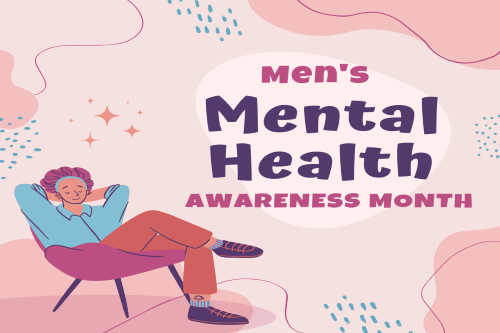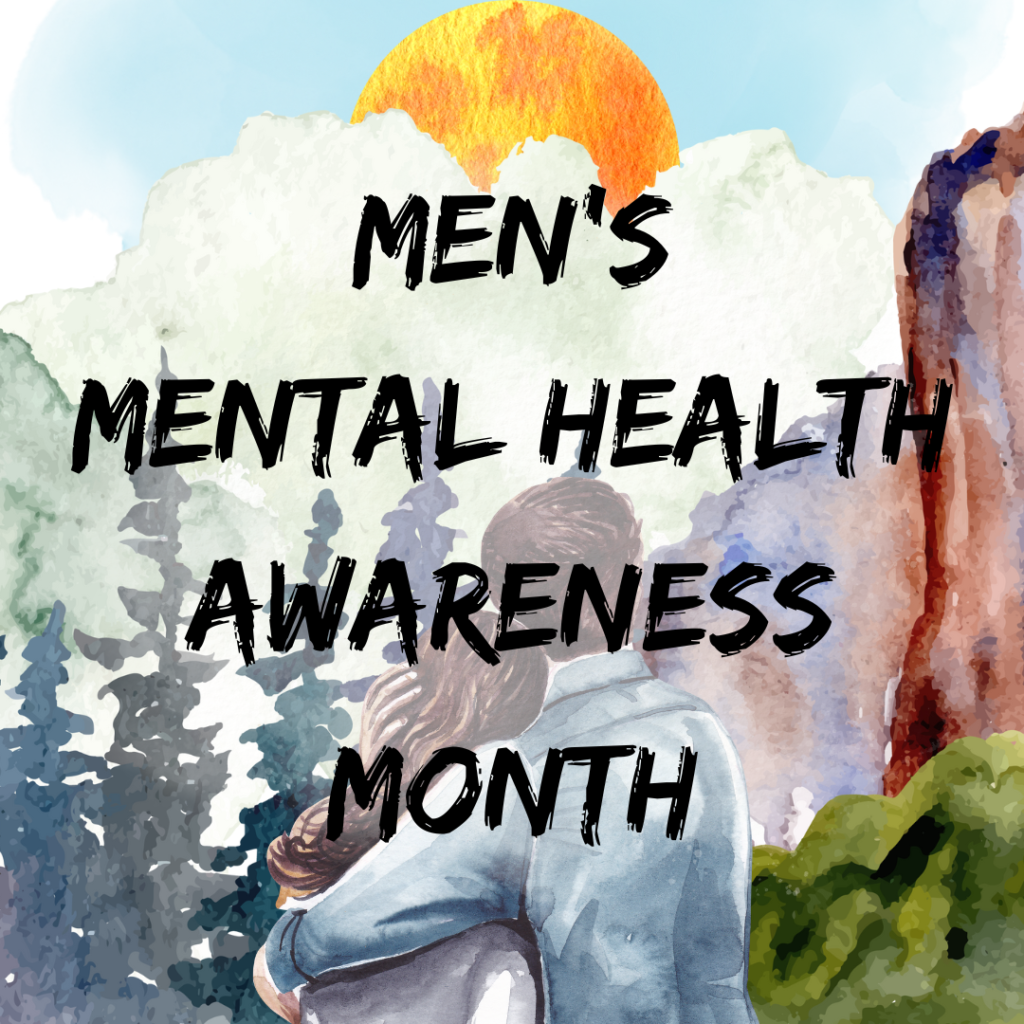Men's Mental Health Awareness Month - Your Well-being Matters
May is a time when we shine a light on something truly important: men's mental health. It's a chance for us to talk openly about well-being for men, to bring forward conversations that might sometimes get pushed aside. This month is about recognizing that health, in all its forms, is for everyone, and that includes the emotional and mental parts of our lives, which are very much connected to our physical state. We hope to encourage a more open approach to how men consider their health needs, making sure that feeling good is a priority for every person.
You see, it's almost a common thing that men are less likely than women to go for those regular check-ups or preventive screenings. This can mean that things which are quite treatable, if caught early, sometimes become more involved situations later on. It’s a pattern we really want to help shift, because waiting can make things much harder than they need to be, and that can certainly weigh on someone's mind.
So, this month, we're really thinking about why men might hold back from getting help and why it’s so important to change that habit. It's about looking at how taking care of your physical self can make a big difference in how you feel mentally, too. We'll explore some common health topics and how paying attention to them can support a happier, more settled life, which is, you know, what everyone deserves.
Table of Contents
- Why Do Men Often Skip Health Checks?
- The Silent Impact on Men's Mental Health Awareness Month
- What About Our Bones and Calcium?
- Keeping Strong for Men's Mental Health Awareness Month
- Dealing with Prostate Health - A Common Concern?
- Finding Comfort and Confidence During Men's Mental Health Awareness Month
- How Can We Address Urinary Concerns?
- Steps to Better Well-being for Men's Mental Health Awareness Month
Why Do Men Often Skip Health Checks?
It's a question many people ask, isn't it? Why do men, more often than women, tend to put off going to the doctor for those regular check-ups or for a preventive screening? This tendency means that situations which are quite treatable, if found early, can sometimes become much more involved. It’s a big reason why we talk about men's health, because catching things early can make all the difference in the world. You know, sometimes there's a feeling that you just have to power through things, or that going to the doctor is only for when something is really wrong. This mindset can, in a way, create a barrier to seeking care.
The truth is, those routine appointments are not just for when you feel unwell. They are actually a chance to make sure everything is running smoothly, to catch small issues before they become bigger ones. For example, a simple screening can spot something that might turn into a problem later on, allowing for easier, quicker ways to help. This proactive approach is a pretty smart way to live, really, and it can save a lot of worry and discomfort down the line. It's about investing in your future self, which, you know, makes a lot of sense.
Think about it like this: if you have a car, you take it in for regular servicing, right? You don't wait for the engine to break down completely before you have a look. Your body is, in some respects, similar. It needs that regular attention to keep performing at its best. Ignoring those little signals or delaying a visit can lead to more serious conditions that could have been avoided. This month, we're really hoping to encourage men to reconsider any reservations they might have about these visits, because their well-being is, after all, very important.
The Silent Impact on Men's Mental Health Awareness Month
When physical health concerns are left unaddressed, they can cast a rather long shadow over someone's mental state. The worry about what might be going on, the discomfort of symptoms, or the fear of a more serious problem can really build up. This quiet stress can lead to feelings of anxiety or a general sense of being down, which is, you know, something we definitely want to avoid. During Men's Mental Health Awareness Month, it’s worth remembering that taking care of your body is a powerful way to support your mind. It's all connected, after all.
Consider the impact of living with a treatable situation that is allowed to get worse. The constant pain, the limitations on daily activities, or the general feeling of being unwell can affect your mood, your sleep, and your relationships. It can make it harder to enjoy life, to be present with family and friends, or to focus on work. This kind of ongoing physical burden can, quite simply, wear a person down. Addressing these physical issues head-on is a practical step towards improving not just your body, but your overall sense of peace and happiness.
So, as we think about Men's Mental Health Awareness Month, let's encourage a shift in perspective. Let's help men see that seeking preventive screenings and regular exams is not a sign of weakness, but a sign of strength and self-care. It's about being proactive, taking control, and choosing a path that leads to greater comfort and a more settled mind. This kind of attention to physical health can be a really big part of feeling good, both inside and out, which, you know, is something we all strive for.
What About Our Bones and Calcium?
Our bones are pretty amazing structures, aren't they? They support us, allow us to move, and protect our vital organs. But like any part of our body, they need proper care and the right building blocks to stay strong. One of the most important of these is calcium. It's generally known that men need about 1,000 milligrams of calcium each day, while women typically need a little more, around 1,200 milligrams. This difference is, in a way, related to various body needs, but the core message is the same for everyone: calcium matters.
When someone doesn't get enough calcium over time, it can lead to a condition called osteopenia. This is basically when your bones start to lose some of their density, becoming a bit thinner. If this bone loss continues, it can progress to osteoporosis, which makes bones much more fragile and prone to breaks. This can be a really serious issue, affecting mobility and overall quality of life. So, getting enough calcium is not just about strong bones now, but about keeping them strong for the future, which is, you know, a pretty good idea.
The good news is that preventing bone loss is often something we can work on through diet and lifestyle. Eating foods rich in calcium, like dairy products, leafy greens, and fortified cereals, can make a big difference. Also, getting enough vitamin D helps your body absorb calcium properly. It’s a simple step, really, but one that has a very big impact on your long-term health. Thinking about bone health is a small but mighty way to support your whole body, and it's certainly worth paying attention to.
Keeping Strong for Men's Mental Health Awareness Month
The connection between physical strength and mental well-being is, in some respects, quite profound. When your bones are strong and your body feels capable, it can contribute to a greater sense of confidence and independence. This feeling of physical resilience can be a powerful antidote to feelings of vulnerability or worry. During Men's Mental Health Awareness Month, it’s important to remember that looking after your bones is not just about avoiding breaks; it's about maintaining an active life and a positive outlook. A body that feels good can help a mind feel good, too.
Imagine the freedom of being able to move around easily, to participate in activities you enjoy, and to simply feel secure in your own body. Inadequate calcium consumption, leading to bone loss, can take some of that freedom away, potentially causing discomfort or limiting what you can do. This can, you know, understandably lead to frustration or a feeling of being less capable. By making sure you get enough calcium, you are actively working to preserve your ability to live a full and active life, which is a really important part of feeling happy and engaged.
So, as we reflect on Men's Mental Health Awareness Month, let's encourage men to consider their calcium intake as a vital part of their overall health plan. It's a simple step that can have far-reaching effects on their physical comfort and, by extension, their mental peace. Paying attention to these foundational aspects of health is a sign of self-respect and a commitment to a better quality of life, which, you know, is something everyone can appreciate.
Dealing with Prostate Health - A Common Concern?
As men get older, there's a pretty common condition that often comes up: an enlarged prostate. It's something many men will experience at some point, and it can cause a range of uncomfortable symptoms, making daily life a bit more challenging. Things like frequent urges to use the bathroom, especially at night, or a weaker urine flow can be quite bothersome. The good news is that there are safe and effective ways to help with this. You see, it's not something you just have to put up with, which is, you know, a really important message to share.
One of the ways to find relief is through a procedure called a Turp, which generally helps symptoms quite quickly. Most men who have this procedure report a stronger urine flow soon after, which can make a big difference in their comfort and sleep. There's also another method called PVP, which is a laser therapy, sometimes referred to as transurethral electroevaporation. These options are examples of how medical advancements offer ways to resolve these issues with minimal discomfort. It's about finding what works best for each person, which is always the goal.
Another approach involves using bipolar energy as a treatment option. This is a minimally invasive way to help resolve the issues caused by an enlarged prostate. The idea is to provide relief with as little disruption as possible to a man's life. Knowing that there are these effective ways to manage a common condition can bring a lot of peace of mind. It’s about not letting a treatable situation turn into something that significantly impacts your daily routine and overall well-being.
Finding Comfort and Confidence During Men's Mental Health Awareness Month
Living with an enlarged prostate can be more than just a physical bother; it can really affect a man's confidence and sense of control. The constant need to find a restroom, the interrupted sleep, and the general discomfort can lead to feelings of frustration or embarrassment. These experiences can, in a way, chip away at someone's mental well-being. During Men's Mental Health Awareness Month, it’s important to acknowledge that addressing these physical concerns can have a very positive impact on a man's emotional state. Feeling comfortable in your own body is a big part of feeling good overall.
When a man experiences quick relief from symptoms, like a stronger urine flow after a procedure, it's not just about the physical change. It’s also about regaining a sense of normalcy and predictability in daily life. This can lead to a significant boost in confidence and a reduction in stress. Knowing that effective treatment options exist, and that they are safe and minimally invasive, can help men feel more empowered to seek help. This sense of agency is, you know, a very important part of mental health.
So, as we talk about Men's Mental Health Awareness Month, let's highlight that taking action on prostate health is a step towards greater comfort and confidence. It’s about removing a source of daily worry and allowing men to live more freely and happily. This proactive approach to physical health is, quite frankly, a powerful way to support mental well-being, helping men feel more settled and secure in their lives.
How Can We Address Urinary Concerns?
Urinary incontinence, or urinary leakage, is a common condition that can be particularly troublesome for men. It’s a situation where there’s an involuntary loss of urine, which can range from a few drops to a complete emptying of the bladder. This can be, you know, quite embarrassing and disruptive to daily life. It’s important to understand that this is a medical condition, not something to be ashamed of, and there are very real treatment options available to help. This isn't a problem that men just have to live with; help is out there.
When we look at the types of incontinence, men are more likely to experience what's called urge incontinence rather than stress incontinence. Urge incontinence happens when there’s a compelling and sudden urge to void that simply cannot be delayed or postponed. It’s that feeling where you absolutely have to go right now, and if you don't make it to a restroom in time, leakage can occur. This can make going out, working, or even sleeping a challenge. It’s a very real concern that affects many men, and it’s important to talk about it openly.
Treatment options for men with urinary leakage include various approaches. For instance, about 80% of men who use male urethral slings see an improvement in their symptoms after surgery. A good number of these men no longer need pads after the procedure, which is a pretty big change in their quality of life. These slings work by providing support to the urethra, helping to control urine flow. Knowing that such effective solutions exist can bring a lot of hope and relief to men dealing with this issue.
The muscles around the bladder, prostate, and rectum, often called the pelvic floor muscles, play a very important part in controlling urine. These muscles also wrap tightly around the anus and urethra. They can weaken with age, or due to conditions like diabetes, or sometimes just become overactive. When these muscles aren't working as they should, it can contribute to urinary leakage. Understanding this can help in finding the right approach to treatment, whether it’s through exercises to strengthen these muscles or other medical interventions. It's all about finding the root cause and addressing it effectively.
On a slightly different note, women are more likely to develop conditions related to vein walls, such as varicose veins. Hormonal changes, like those due to pregnancy or menopause, may be a factor because hormones tend to relax vein walls. While this is more common in women, it's still a good reminder that our body's systems are all connected, and general health practices benefit everyone. A workout that has a difficulty level of beginner to moderate, which can be done at home using a sturdy chair with no cushion, can be beneficial for overall fitness, supporting circulation and general well-being for both men and women, which, you know, is always a good thing.
Steps to Better Well-being for Men's Mental Health Awareness Month
Living with urinary incontinence can be a really isolating experience, and it can take a significant toll on a man's mental health. The constant worry about leakage, the need to plan every outing around restroom access, and the potential for embarrassment can lead to withdrawal, anxiety, or a diminished sense of self-worth. This kind of ongoing stress is, you know, a heavy burden to carry. During Men's Mental Health Awareness Month, it's absolutely vital to recognize that addressing urinary concerns is a key step towards improving overall well-being.
The success rates for treatments like male urethral slings, where many men no longer need pads, illustrate just how much positive change is possible. Imagine the freedom and peace of mind that comes from no longer having to worry about urinary leakage. This physical relief translates directly into a boost in confidence, a greater willingness to engage in social activities, and a much improved quality of life. It’s about giving men back a sense of control over their bodies and their lives, which is, in some respects, priceless.
So, as we talk about Men's Mental Health Awareness Month, let's encourage men to speak openly about urinary issues and to seek the help they deserve. Whether it’s strengthening pelvic floor muscles through specific exercises or exploring surgical options, taking action is a powerful step towards feeling better, both physically and mentally. It's about breaking down the barriers of silence and embarrassment, and choosing a path that leads to greater comfort, confidence, and a more fulfilling life, which, you know, is what everyone deserves.

November: Men's Mental Health Awareness Month

Men's Mental Health Awareness Month | Student Hub | City, University of

What is Men’s Mental Health Awareness Month?